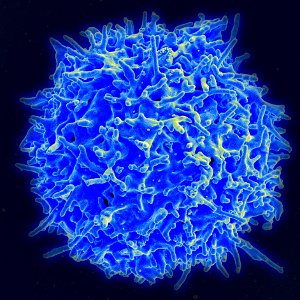Immune cells use steroids

Researchers at the Wellcome Trust Sanger Institute and the European Bioinformatics Institute (EMBL-EBI) have discovered that some immune cells turn themselves off by producing a steroid. The findings have implications for the study of cancers, autoimmune diseases and parasitic infections.
The scientists in the Sanger Institute-EBI Single-Cell Genomics Centre looked at the activity of genes in Th2 immune cells during parasitic infection and saw that, at a certain point, these cells produce a steroid called pregnenolone, which is involved in suppressing the immune response.
“We were really surprised to see that these immune cells are producing a steroid. In cell culture, we see that the steroids play a part in regulating T cell proliferation. We had already seen that T-helper cells were producing steroids, but initially we were blind – what was going on?”
Dr Bidesh Mahata A member of Sarah Teichmann’s research group at the Sanger Institute and EMBL-EBI
The study used single-cell sequencing data and sophisticated statistical methods to confirm for the first time that the immune cells are able to self-regulate once they have finished battling infection.
“Because we had access to data from single-cell sequencing experiments, we could conduct deep statistical analyses on a very large and comprehensive dataset. That pointed us to the genes involved in pregnenolone production at the point when Th2 cells are being produced, and we could deduce that the Th2 cells themselves were involved in immunosuppression.”
Dr Sarah Teichmann Faculty member of the Sanger Institute and Senior Group Leader at EMBL-EBI
The researchers suggest that bringing the immune system back into balance is an intrinsic part of this particular immune response.
“We confirmed our findings experimentally, showing that pregnenolone inhibits both Th cell proliferation and B cell immunoglobulin class switching. We think this points to the idea that Th2 cells differentiate into steroid-producing cells as part of a larger mechanism to bring the immune system back into balance.”
Dr Bidesh Mahata
The findings from this study are strengthened by those of the Gelfand group at National Jewish Health in Denver, US. The next step for the team is to investigate how the process starts, what other tissues are involved and which types of infection give rise to this response.
More information
Funding
Please see the paper for a full list of funding bodies.
Participating Centres
Please see the paper for a full list of participating centres.
Publications:
Selected websites
The European Bioinformatics Institute
The European Bioinformatics Institute is part of the European Molecular Biology Laboratory (EMBL), Europe’s flagship laboratory for the life sciences. EMBL-EBI provides freely available data from life science experiments covering the full spectrum of molecular biology, and performs investigator-led research using computational approaches to unravel the secrets of life. Our extensive training programme helps researchers in academia and industry to make the most of the incredible amount of data being produced every day in life science experiments. We are a non-profit, intergovernmental organisation funded by EMBL member states. Our 500 staff hail from 43 countries, and we welcome a regular stream of visiting scientists throughout the year.
The Wellcome Trust Sanger Institute
The Wellcome Trust Sanger Institute is one of the world’s leading genome centres. Through its ability to conduct research at scale, it is able to engage in bold and long-term exploratory projects that are designed to influence and empower medical science globally. Institute research findings, generated through its own research programmes and through its leading role in international consortia, are being used to develop new diagnostics and treatments for human disease.
The Wellcome Trust
The Wellcome Trust is a global charitable foundation dedicated to achieving extraordinary improvements in human and animal health. We support the brightest minds in biomedical research and the medical humanities. Our breadth of support includes public engagement, education and the application of research to improve health. We are independent of both political and commercial interests.


